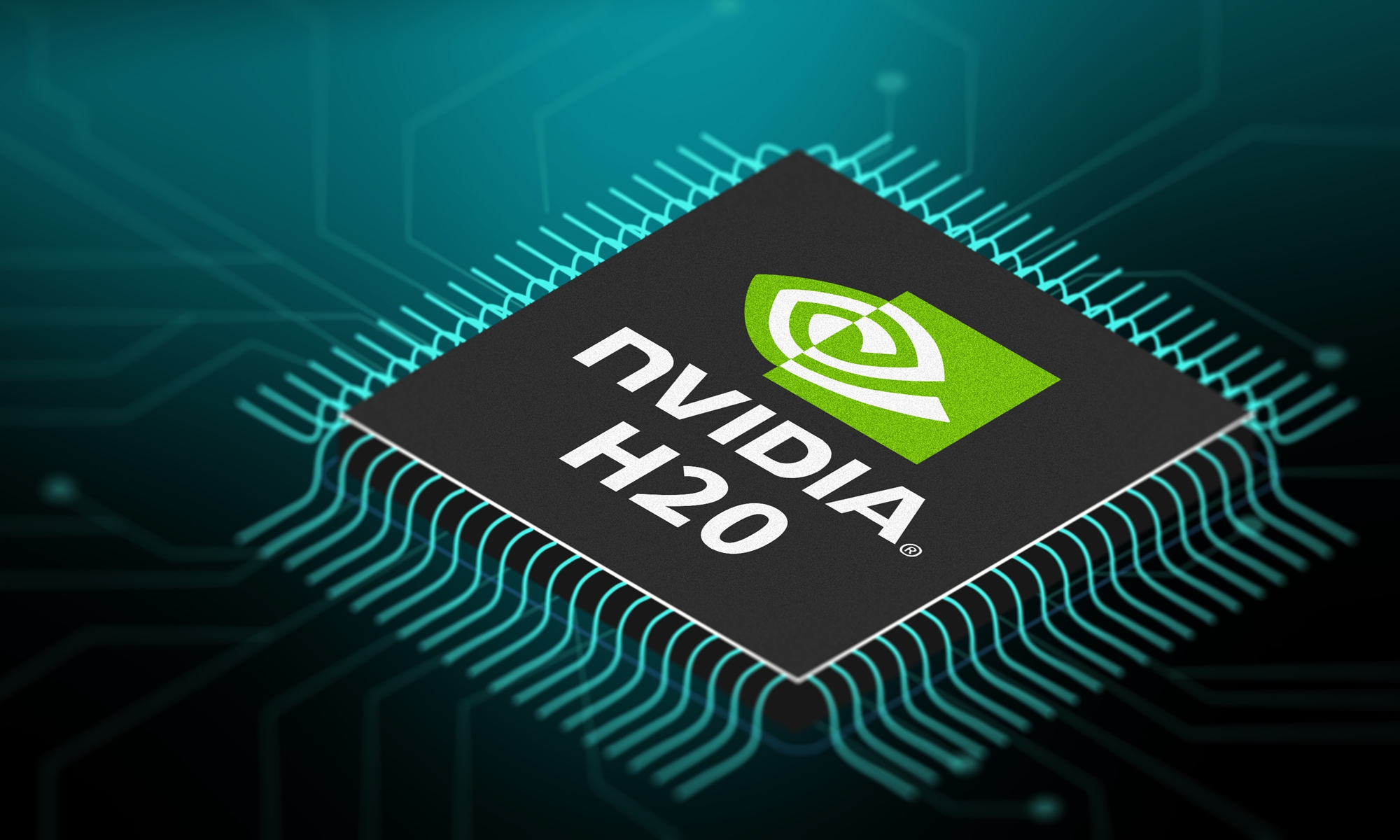
Nvidia H20 chip Photo: VCG
In a latest display of what an expert described as economic extortion, US Treasury Secretary Scott Bessent has touted a controversial deal allowing US chip giants Nvidia Corp and Advanced Micro Devices Inc (AMD) to sell lower-end AI chips to China, but only on the condition that they hand over 15 percent of the related revenue to the US government.
Bessent hailed the arrangement as one that "could serve as a model for others" in a Bloomberg interview on Wednesday in remarks that a Chinese expert said underscored Washington's growing appetite for extracting profits from global trade at the expense of fair competition and mutual benefit.
Bessent's comments come amid escalating US efforts to curb China's technological advancement while openly seeking to reap illicit gains from it. Nvidia and AMD have agreed to pay 15 percent of their revenues from Chinese AI chip sales to the US government under what Bloomberg described Monday as "an unusual, a legally questionable deal that reflects the Trump administration's willingness to soften export controls in exchange for financial payouts."
"I think we could see it in other industries over time," Bessent said Wednesday in a television interview on Bloomberg Surveillance. "Right now, this is unique, but now that we have the model and the beta test, why not expand it?" Bessent said, according to a Bloomberg report.
The US official's latest remarks lay bare the hypocritical nature of US trade policies, as Washington's chip export restrictions and coercion of companies lack a clear legal basis and run counter to the fundamental principles of a market economy, Xiang Ligang, a Chinese telecom industry expert, told the Global Times on Thursday.
"It is a form of financial coercion aimed at US companies, but its ripple effects on market trust and supply chains cannot be ignored," Xiang said. "This also signals an expanding attempt to weaponize and politicize economic tools to maintain its hegemony in the high-tech sector."
"If such revenue-sharing schemes become widespread, Chinese companies may face higher costs or reduced access to certain imported technologies, and market competition could be distorted," Xiang said. "Chinese enterprises may then shift to domestically produced alternatives, which could accelerate local innovation but also create short-term supply disruptions."
Xiang further warned that such practices will not only further erode the trust in Nvidia within the Chinese market, but also disrupt global supply chains, drive up costs for end users, and ultimately undermine US innovation and sustainable development.
Asked on Monday about Nvidia and AMD have agreed to give the US government 15 percent of their revenues from chip sales in China, under an arrangement to obtain export licenses for the semiconductors, Chinese Foreign Ministry Spokesperson Lin Jian said that China has made its position clear more than once on the export of chips to China.
"China's position on opposing the politicization and weaponization of tech and trade issues, and on malicious blockade and suppression against China, is consistent and clear. Such practices disrupt the stability of global industrial and supply chains and are in no one's interests," Lin stressed in another question about US export controls on high-bandwidth memory chips.
Xiang emphasized that as the world's largest semiconductor market, China has long advocated open and cooperative technological exchanges. Procurement decisions by enterprises are made independently based on market principles, he said.
"When the US-provided H20 chips have downgraded performance, unreliable supply, and potential security risks, it is only natural for Chinese companies to choose domestically produced alternatives that better meet market and security needs" Xiang said.
Recently, the Cyberspace Administration of China's summoning of Nvidia over security risks linked to alleged "back-door" vulnerabilities in the H20 chip has drawn wide domestic and international attention. Despite Nvidia's repeated denials, the People's Daily, in an opinion piece titled "How can we trust you, Nvidia?" earlier this month, called on the US chipmaker to provide proof of its security measures to regain the trust of Chinese customers.
The Chinese government has consistently welcomed foreign companies, including Nvidia, to operate lawfully in China, with the success of US firms such as Microsoft, Intel and Qualcomm in the Chinese market serving as clear evidence, Xiang said.
"For US companies such as Nvidia to succeed in the Chinese market, the US government must provide stable and consistent policy support, rather than subjecting companies to shifting rules and political interference," he said.
